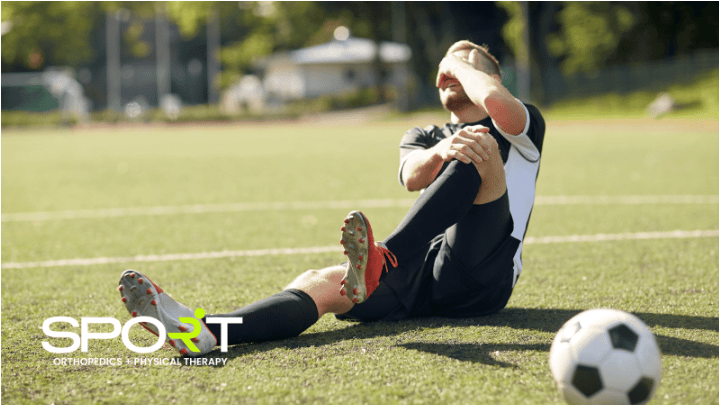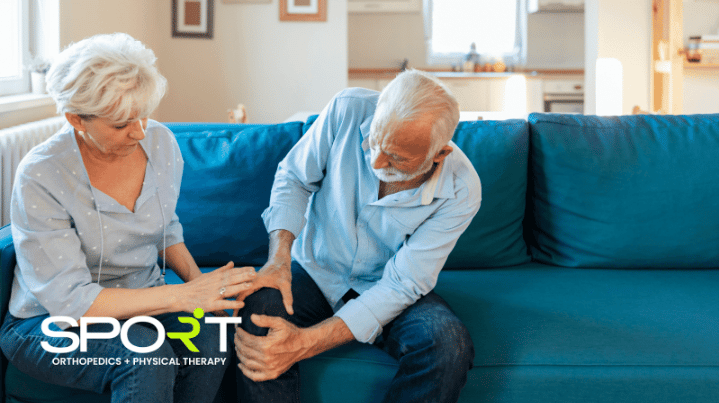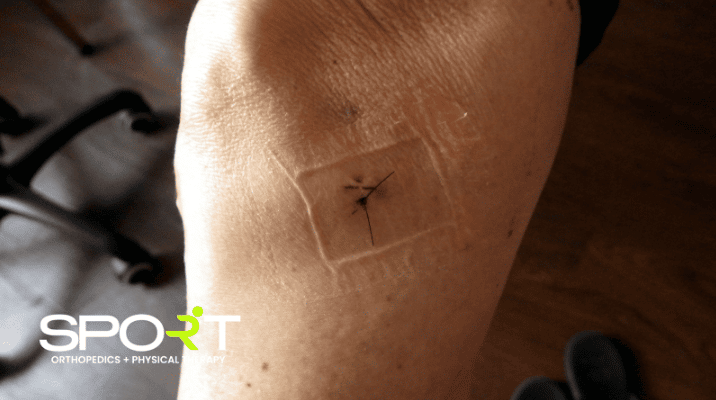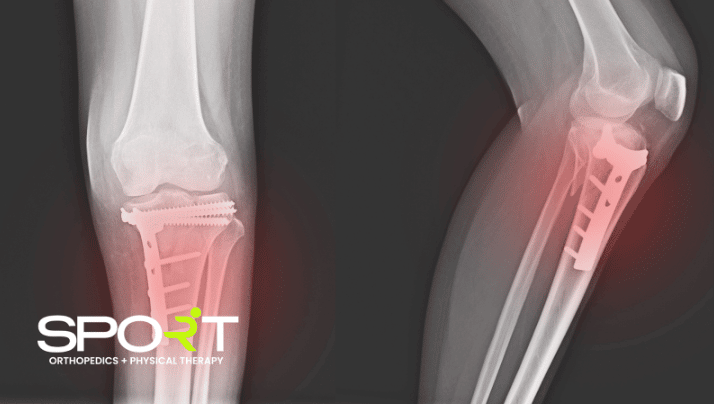
Knee pain shows no favoritisms for whom it selects to become its next victim. It is known to affect adults and children of all ages. For young adults complaining of knee pain, we often find that an injury is the culprit. When a person has an affected knee that causes knee pain, the individual's underlying condition is likely related to rupturing main ligaments or torn cartilage. They may begin to wonder what can cause knee pain without injury.
When minor knee pain is present, many self-care methods work well to encourage healing, and most respond well. Physical therapy and knee braces can alleviate knee pain in some severe cases. But how do I know if my knee injury is serious? Should your knee pain become a painful condition that develops gradually into chronic knee pain, your knee injury may require a surgical repair (or knee surgery) to resolve the common knee injuries causing your pain. To schedule an appointment with the best Dallas orthopedic surgeon, please call SPORT Orthopedics + Physical Therapy at 469-200-2832 today or fill out our online intake form.

The truth is that severe knee pain isn't random pain at all. Knee pain is a common complaint among the population, and at some point, knee pain will catch up to you.
Everyday activities that cause wear and tear, such as twisting, turning, bending, etc., are also likely to cause knee injuries.
While young adults can certainly have an affected knee that causes pain and swelling, individuals over 55 are more likely to experience chronic knee pain. The symptoms of pain and swelling can appear and disappear at what seems like random intervals. However, the overall issue is likely associated with either an underlying condition to the knee itself or issues with soft tissue or other joints surrounding the knee.
When you experience seemingly random knee pain, SPORT Orthopedics + Physical Therapy can evaluate your symptoms and health conditions, and determine treatment options for your knee injury.
Knowing when to see a doctor for your knee pain is critical to prevent further knee injuries from occurring. Peer-reviewed studies indicate that, without some form of treatment, whether these are surgical treatments or non-invasive treatments, knee pain can develop gradually into worsening conditions that affect the knee, causing long-term knee problems.
If you experience any of the following symptoms, you should contact a doctor regarding your knee pain:

Knee injuries can cause severe knee pain. The most commonly affected areas that cause knee pain are near main ligaments, fluid-filled sacs or tendons surrounding the knee joints, and bones. Our Knee Pain Location Chart may give you a better idea of the conditions that affect each part of the knee. Common knee injuries that cause severe knee pain include the following.
The ACL, or anterior cruciate ligament, is one of the four main ligaments that connect the thigh bone to your shinbone. ACL injuries can include ACL tears or ACL sprains. These injuries are common among athletes who play sports like soccer. Other sports requiring a knee, joint, or other lower leg portion of the body to make repetitive movements or a sudden direction change can also lead to ACL tears. ACL tears will sometimes require ACL reconstruction surgery in order to repair the problem causing pain.

Arthritis is a commonly known painful condition that causes pain, swelling, and tenderness. This condition is so common that over 100 different types of arthritis exist today.
Those with knee arthritis may experience one or multiple arthritis symptoms at once, depending on the type of arthritis.
The main types of arthritis that can be responsible for knee problems include osteoarthritis, rheumatoid arthritis, gout, pseudogout, or septic arthritis. If you suffer from arthritis pain, seek arthritis treatment from the professionals at SPORT Orthopedics + Physical Therapy.
Knee osteoarthritis is often attributed to underlying health conditions such as obesity, excess weight issues, posture problems, or relation to a past injury. This condition is characterized by deterioration of one's knee, which causes symptoms of inflammation and swelling.
Symptomatic knee osteoarthritis pain can occur when the cartilage is worn down over time and no longer serves as a cushioned divider between bones that make up the knee joint. While there is no cure for this type of knee arthritis, apart from a cartilage transplant, knee pain can be managed with other treatments.
Treatment options for knee osteoarthritis focus on minimizing pain and swelling in this condition. Anti-inflammatory medications, like NSAIDs, are often recommended as an over-the-counter option to reduce swelling and discomfort.
After one of our knee specialists has determined the extent of your osteoarthritis, we may recommend joint replacement or cortisone injections.
In addition to anti-inflammatory medications, one of our Dallas knee specialists may also recommend physical therapy sessions for your osteoarthritis with experienced Dallas physical therapists, like the physicians at SPORT Orthopedics + Physical Therapy.
Rheumatoid arthritis is an inflammatory disorder affecting the knee joints' lining. This type of arthritis occurs when the body attacks its own tissues. Although this particular form of arthritis is impossible to reverse, it can be managed or treated to reinstate a sense of normal function.
In contrast to osteoarthritis, rheumatoid arthritis affects several joints in the body, making an individual's discomfort level even greater.
This condition causes significant pain and also decreases the range of movement. Although the affected knee shows symptoms such as stiffness, tenderness, and swelling, rheumatoid arthritis can also exacerbate a number of related conditions beyond these symptoms. For example, rheumatoid arthritis may cause a loss of appetite or symptoms relating to that fatigue.
Treatments for this form of arthritis include NSAIDs, steroids, physical therapy, and in severe cases, surgery is needed. Surgical operations involve synovectomy and joint fusion. Both surgical procedures are semi-frequent solutions used to help reduce one's pain and discomfort for this arthritis.
Gout and pseudogout, forms of arthritis, can generally cause severe pain, tenderness, swelling, redness, and warmth in the knee joint. Typically, both conditions can simultaneously affect an individual in one knee, both knees, and other body parts.
Individuals at risk for this type of arthritis often maintain an unhealthy lifestyle and are above 55 years of age. Once an individual allows the issue to develop gradually into the further stages of a gout condition, the knee problems can cause bone deformity and destruction.
Gout is caused when uric acid crystals are produced in excess or by failure to remove them fast enough in an individual's kidneys.
Pseudogout is defined as a calcium pyrophosphate deposition disease, causing pain that lasts for days or sometimes even weeks. This condition is caused by calcium-containing crystals that pass into the knee fluids. When the combination of calcium-containing crystals and mixed fluids enters the knee, this causes the thyroid levels to change.
Treatments often include oral medications, which can sometimes lower uric acid levels for gout. When treating pseudogout, we often drain fluid from the joint and instruct the patient to take anti-inflammatory medications to help the symptoms.
If a knee joint becomes infected, swelling and redness are likely to be visible where the infection is present. Septic arthritis generally occurs in combination with a fever and infection. However, no trauma before the arrival of pain is necessary to cause the condition.
This form of arthritis can develop quickly and cause significant damage to the knee cartilage. When knee pain symptoms occur with any symptoms of septic arthritis, it's in your best interest to contact your doctor immediately or seek your closest medical emergency clinic.

Baker's cysts, often called popliteal cysts, are fluid-filled swelling pockets on the backside of the knee. The cysts' location and positioning can severely hinder one's range of movement. When mobility becomes limited, daily activities and overall comfort become challenging.
In some cases, baker's cyst symptoms can stem from untreated injuries, such as a cartilage tear. A Baker's cyst is the joint fluid accumulation caused by increased synovial fluid production, whose purpose is to lubricate the knee joint.
Typical signs of a baker's cyst include restricted movement, swelling behind the knee, and in severe cases, pain that travels into other joints that connect muscles.
In severe cases, treatment for a baker's cyst includes compression ice packs, anti-inflammatory meds, plenty of rest, and drainage of joint fluid.

Knee bursitis occurs over various joints throughout the body and is commonly caused by repetitive movements. This wear and tear condition causes extreme discomfort and can be reversed if caught in time. However, due to the irritation of the bursae, tiny pockets of fluid that form a layer of protection for the tendons, bones, and muscles are destroyed.
Given the continuous strain causing joint pain, treatment for bursitis includes lots of rest. Other treatments include anti-inflammatory meds and ice packs, and should you experience pain worse than in the initial stages, contact the SPORT Orthopedics + Physical Therapy professionals.
A mechanical problem, like a dislocated kneecap, occurs when the triangular bone covering the patella dislodges near or outside your knee. Sometimes, the kneecap stays displaced, and the dislocation is visible.
The position of the iliotibial band is located on the outermost portion of the thigh bone, extending from the outer hip to the inside knee cap. Once the tightening occurs, rubbing of the iliotibial band begins against the outer parts of the thigh bone; this is often referred to as iliotibial band syndrome.
Patellofemoral pain syndrome often develops gradually and has more tendencies to affect younger children. This particular condition is common and can be treated with PT and NSAIDs.
Patellar tendinitis causes both inflammation and irritation simultaneously to the tendons. When the patellar tendon endures an injury, inflammation can affect the knee.

Knee fractures can cause extreme pain, especially during a hard fall. Injuries become easier to reoccur when other factors are combined with a hard fall, like osteoarthritis.
The meniscus is generally described as the tough, rubbery cartilage acting as shock absorbers between the thigh bone and shinbone. A sudden knee twist while bearing weight on it can cause this torn meniscus injury.

The Dallas SPORT Orthopedics + Physical Therapy specialists understand the severe pain and discomfort associated with athletic-related injuries to the knee joint. In fact, the number of injuries that cause knee pain is practically endless. Severe knee pain without treatment can cause long-term conditions that often require a surgical fix.
If you have knee pain or joint pain that keeps you from enjoying your daily activities, call for a consultation with a Dallas orthopedic specialist. Our goal is to reduce or completely alleviate the pain and discomfort you face regularly. Although the list of injuries can seem intimidating, our specialists are here to guide and comfort you throughout your road to recovery. You can schedule an appointment online or call 469-200-2832.







*We accept most all insurance plans, if you do not see your plan listed above or have any questions, please contact our office.

SPORT Orthopedics + Physical
Therapy – Dallas, TX
Services:
• Clinic • Orthopedic • Urgent Care
• Physical Therapy
18152 Preston Road
Suite I-2
Dallas, TX 75252
Phone: (469) 200-2832
Fax: (469) 269-1074
SPORT Orthopedics + Physical Therapy – Frisco, TX
Services:
• Clinic • Orthopedic • Urgent Care
• Physical Therapy
9255 Dallas Parkway
Suite I20
Frisco, TX 75033
Phone: (469) 200-2832
Fax: (469) 269-1074
SPORT Orthopedics + Physical
Therapy – Wylie, TX
Services:
• Clinic • Orthopedic • Urgent Care
• Physical Therapy
3400 FM 544
Suite 650
Wylie, TX 75098
Phone: (469) 200-2832
Fax: (469) 269-1074
SPORT Physical
Therapy – Prosper, TX
Services:
• Physical Therapy
790 N Preston Rd
Suite 60
Prosper, TX 75078
Phone: (469) 200-2832
Fax: (469) 269-1074
SPORT Orthopedics – Mesquite, TX
Services:
• Clinic
• Orthopedic
• Urgent Care
1102 North Galloway Ave
Mesquite, TX 75149
Phone: (469) 200-2832
Fax: (469) 269-1074